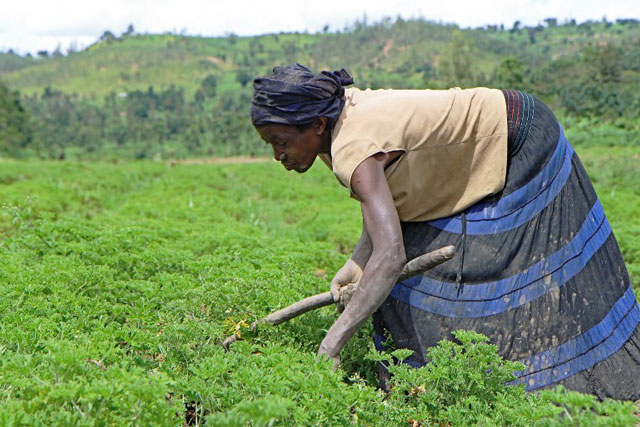
Gahara, Rwanda | AFP | Inside a metal shed in southeastern Rwanda, Nicholas Hitimana brandished a plastic container holding a green liquid: geranium essential oil, freshly distilled and ready for export at more than $200 (175 euros) a kilo.
The pioneer of essential oils in Rwanda, Hitimana said he understood over a decade ago “the need to develop high-value crops” in his hilly nation of just 2.6 million hectares (6.4 million acres).
Agriculture accounts for nearly a third of GDP and employs four-fifths of the population and, as a result, there is “little arable land” remaining.
“On a hectare, if we grow beans, we earn about $2,000 a year, whereas on the same land, if we grow geranium, the income can reach $6,000 or even $8,000,” Hitimana says.
The trained agronomist embodies Rwanda’s ambition of diversifying its agriculture and increasing the value of exports by getting into the lucrative global market for essential oils. To this end, Hitimana has been importing geraniums from South Africa since 2004.
At the time the flower was virtually unknown in Rwanda, but Hitimana was convinced of the “great potential” of the essential oil sector.
– Four crops a year –
“In South Africa there can only be two harvests a year, but here, as there is no winter, it is possible to get up to four crops a year,” says Hitimana, whose company Ikirezi Natural Products has since grown and diversified.
With 25 hectares of plantations, it produces 1,000 kilogrammes of essential oils derived from patchouli, lemon grass and eucalyptus as well as geraniums. The oils are exported to Canada, South Africa, the US and elsewhere for use in the perfume industry.
The company employs 70 farmers. “At first, it was not easy to convince them to abandon subsistence for commercial agriculture,” he says, adding the work is more precise than growing beans.
“We need to plant on time, manure on time, hoe, turn the soil, irrigate and harvest on time”, or risk a “drastically” reduced yield, Hitimana says, noting that it takes between 600-1,000 kilos of geraniums to produce a single kilo of oil.
 The Independent Uganda: You get the Truth we Pay the Price
The Independent Uganda: You get the Truth we Pay the Price


